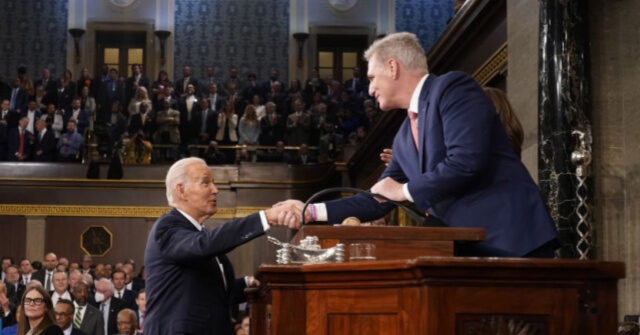

House Speaker Kevin McCarthy (R-CA) and President Joe Biden have come to an agreement on raising the debt ceiling, McCarthy announced Saturday night.
The tentative agreement, which includes raising the debt ceiling through roughly the next two years in exchange for some of Republicans’ desired spending cuts and other concessions, comes after days of tense negotiations.
McCarthy said in a brief press conference that while they still have to spend the evening ironing out details and that text of the bill will come Sunday, he said he believes the agreement is “worthy of the American people.”
Republicans are poised to deliver big, consequential change in Washington. Soon, we will vote for a responsible debt limit agreement that stops Democrats’ reckless spending, claws back unspent COVID funds, blocks Biden’s new tax schemes, & much, much more https://t.co/TQ7CblFsaM
— Kevin McCarthy (@SpeakerMcCarthy) May 28, 2023
“It has historic reductions in spending, consequential reforms that will lift people out of poverty into the workforce, rein in government overreach. There are no new taxes, no new government programs,” McCarthy said.
He noted that he expects Congress members, most of whom have left Washington for Memorial Day weekend and recess, to return Wednesday to vote on the bill package, a timeline that indicates McCarthy is following House rules of allowing lawmakers a full three days to review the text.
McCarthy spoke just ahead of a call with Republican members during which he was expected to brief them on provisions of the bill package, according to a source familiar with the plans.
The deal between McCarthy and the president comes a day after Treasury Secretary Janet Yellen warned the U.S. would run out of cash to meet all of its financial obligations on June 5 and that failure to address the debt limit before then would have catastrophic economic consequences.
In April, McCarthy led House Republicans to pass a deal to raise the debt limit through next year in exchange for drastic spending cuts that would save an estimated $4.8 trillion over the next ten years. The bill included expanding work requirements for welfare recipients, taking back unspent money allocated toward COVID, permitting reforms, blocking Biden’s student loan bailout, and more.
This new agreement, while raising the debt limit higher than the House GOP’s original bill, is expected to preserve some of Republicans’ desired spending reductions. Its passage would mark a significant win for House Republicans, who have been faced with negotiating with a Democrat president and Democrat-controlled Senate and who have not been effective at leveraging the debt ceiling for any meaningful concessions in more than a decade.
While some Republicans, particularly those in the House Freedom Caucus, have already begun expressing their opposition to the deal, Rep. Marjorie Taylor Greene (R-GA) spoke out favorably about it Saturday night, praising it for rescinding COVID money that she said would have otherwise benefitted foreign nations, including adversaries like China.
McCarthy will likely need to rely on some Democrat votes given Republicans’ narrow majority only affords him a few defectors before a bill would fail.
Biden, for his part, has been under pressure to win over members of his party in the Senate and House on the matter after he and Democrat leaders for months refused to negotiate anything other than a clean debt ceiling hike.
The president began managing expectations in a statement Saturday night, saying that while the “agreement protects my and Congressional Democrats’ key priorities and legislative accomplishments,” it is a “compromise,” which means “not everyone gets what they want.”
Earlier this evening, Speaker McCarthy and I reached a budget agreement in principle.
It is an important step forward that reduces spending while protecting critical programs for working people and growing the economy for everyone. And, the agreement protects my and…
— President Biden (@POTUS) May 28, 2023
The deal includes, according to a document circulated by the Republican House Conference and obtained by Breitbart News, rolling back non-defense discretionary spending to fiscal year 2022 levels and capping spending growth at one percent for the next six years.
It also excludes tax increases and makes a “significant reform” to the National Environmental Policy Act, as well as rescinds funding allocated for new IRS agents and $400 million from a COVID-related “Global Health Fund,” per the document.
Write to Ashley Oliver at [email protected]. Follow her on Twitter at @asholiver.





